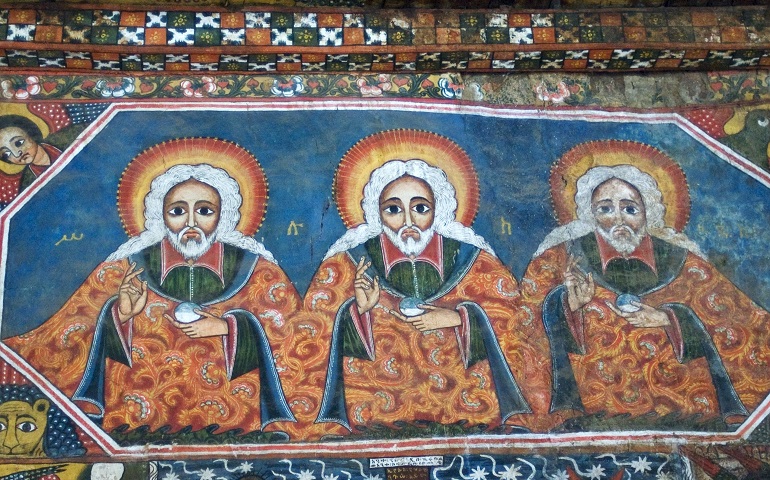
The Holy Trinity is depicted in the Church of Debre Berhan Selassie in Gondar, Ethiopia. (Wikimedia Commons/A. Davey)
Editor's note: "Take and Read" is a weekly blog that features a different contributor's reflections on a specific book that changed their lives. Good books, as blog co-editors Congregation of St. Agnes Sr. Dianne Bergant and Michael Daley say, "can inspire, affirm, challenge, change, even disturb."
God for Us: The Trinity and Christian Life
by Catherine Mowry LaCugna
HarperSanFrancisco, 1991
It was as a lay minister that I first came to a decision to pursue a doctorate in theology. I had already worked in the church as a pastoral minister in a variety of capacities. The opportunities to teach and write that these ministries offered me are what led me to pursue doctoral studies at the University of Notre Dame.
At the time, I was interested in exploring the intersection between moral theology and ecclesiology and looked forward to the opportunity to study under Jesuit Fr. Richard McCormick, Fr. Richard McBrien and Dominican Fr. Thomas O'Meara. It was only after arriving at Notre Dame that I was introduced to a young, rising star on their faculty, Catherine Mowry LaCugna.
Soon after my arrival in South Bend, Ind., my academic adviser encouraged me to register for LaCugna's doctoral seminar on the Trinity. I signed up for the course only reluctantly. LaCugna was brilliant and could be quite intimidating. Besides, I had very little interest in Trinitarian theology. I associated reflections on the Trinity with a more abstract, metaphysical mode of theological reflection, one far removed from my interests in moral theology and ecclesiology.
Fortunately, I took the course anyway, and an exhilarating world of theological insight opened up before me. Over the course of the semester, LaCugna rehearsed the main themes that would appear in her most important work, God for Us, published in 1991. The book established her as a major figure in Catholic theology, but her great promise would only be partially realized, as she succumbed to cancer in 1997 at the age of 44.
Her book, which I read immediately upon its publication, only amplified the themes that had so captivated me in her seminar. My engagement with her work instigated nothing less than an intellectual conversion as I rediscovered the most "practical" doctrine of the Christian faith.
Like so many Christians, I had long dismissed the Trinity as one of the most arcane of church doctrines, an unsolvable arithmetic problem. (How can 3=1?) As Karl Rahner had famously put it in his book The Trinity:
Despite their orthodox confession of the Trinity, Christians are, in their practical life, almost mere "monotheists." We must be willing to admit that, should the doctrine of the Trinity have to be dropped as false, the major part of religious literature could well remain unchanged. ... One has the feeling that, for the catechism of the head and heart (as contrasted with the printed catechism), the Christian's idea of the incarnation would not have to change at all if there were no Trinity.
At a more basic level, when the Trinity did inform the popular religious imagination, it functioned at a rather simplistic level, suggesting "two men and a bird" in heaven.
In more academic circles, the marginalization of the doctrine of the Trinity was less obvious; nevertheless the power of the doctrine was often obscured in an arid Neo-Scholastic tradition that worked through an abstract fog of Trinitarian notions, processions, missions and relations.
LaCugna's book punctured both the misleading tendencies of popular catechesis (e.g., using the shamrock or the three states of H2O to explain the doctrine) and the intellectual esotericism of the Neo-Scholastic tradition.
For LaCugna, the Trinity names how God is God for us. It reminds us that while we experience relationships as something that we are always either moving into or withdrawing from, God does not enter into relationships. Indeed, God does not have relationships at all; God is perfect relationship. "God is essentially relational," she wrote.
Moreover, if God is perfect relationship, and we are created in the image of God, then the doctrine of the Trinity is concerned with our life as well. We are called by divine grace to enter into that mode of loving relationship that defines God's very being.
The first half of her magisterial work represented a rich exploration of the Christian tradition, East and West, as she demonstrated how over the centuries the Trinity receded from its early centrality to the theological margins of the Christian tradition. It was the early Christian experience of God's saving action through Christ and in the Spirit, not abstract reflection, that gave rise to Trinitarian doctrine, she insisted.
The Trinity evokes a God whose being is characterized by an eternal movement toward us, if you will, in redeeming love. Yet LaCugna also insisted that the Trinity names our graced movement toward God.
In other words, the Trinity was as much about doxology (the praise of God) as it was about soteriology (salvation). It is the Holy Spirit at work in our hearts that moves us to prayer and worship as we unite ourselves with Christ in offering praise to God.
This doxological dimension of the Trinity is not limited to formal, public worship. Liturgy is a ritual performance of a doxological way of life. We give glory (doxa) to God by living in right relationship with God and God's creatures. Praise is what allows us to get over ourselves, to enter into the logic of "overflow," a dynamic movement toward God and others characterized by a kind of self-forgetfulness. This doxological living does not distract us from our obligations to others; a life of justice and solidarity is grounded in our communion with the triune God.
Within this theological horizon, sin is revealed as a perversion of right relationship or, as LaCugna provocatively put it, "sin … is the absence of praise."
Finally LaCugna's book has helped me think about my own field of study, ecclesiology, with fresh eyes. She wrote:
Just as the doctrine of the Trinity is not an abstract teaching about God apart from us but a teaching about God's life with us and our life with each other, ecclesiology is not the study of an abstract church but a study of the actual gathering of persons in a common faith and a common mission,
Baptism is initiation into the triune life of God, "which is indistinguishable from God's life with every creature throughout time, past, present and future." Participation in that triune life is mediated through the life of the church.
LaCugna was herself influenced by the work of Yves Congar and the Eastern Orthodox theologian John Zizioulas, both of whom articulated a deeply Trinitarian theology of the church as a communion of persons. The church is called, even though it so often fails to live up to that call, to be the new "household of God's reign" that offers a radically new form of human existence in Christ.
LaCugna appreciated the extent to which the Second Vatican Council had recovered the Trinitarian foundations of the church. "The church on earth is by its very nature missionary," the council taught in Ad Gentes (the Decree on the Church’s Missionary Activity, 1965), because "it has its origin in the mission of the Son and the Holy Spirit."
She saw this Trinitarian dimension in the church's sacramentality; the church is to be a visible embodiment before the world of life in the Risen Christ. Her commitment to a thoroughly relational vision of the church has implications for our understanding of church ministry.
For centuries, the Catholic church has struggled with an overly juridical understanding of such ecclesial realities as ministry and power. We have conceived ordination as the conferral of discrete "powers" on autonomous individuals who then wield those powers over other believers. Yet LaCugna insisted on the priority of baptism, not ordination, as the decisive sacrament for constituting the church. It is baptism that introduces the believer into a fundamental ecclesial relationship, Christian discipleship.
Ordination, in turn, draws the believer into a new ecclesial relationship within the ecclesial communion, one dedicated to public service in the church. It is only when ministerial leadership is understood in this way that we can hope to overcome the sin of clericalism.
LaCugna offered us a profoundly contemplative, compelling and eminently pastoral account of the triune God who comes to us as Word and Spirit and draws us into divine communion through the life of the church. Hers is a vision of God who is, at the heart of the divine being, God for us.
[Richard Gaillardetz is the Joseph Professor of Catholic Systematic Theology at Boston College.]
